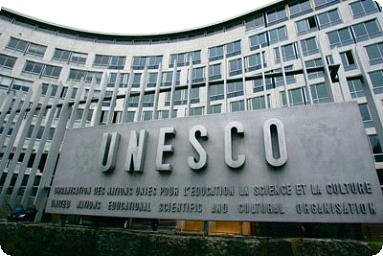About UNESCO
United Nations Educational, Scientific and Cultural Organization (UNESCO)
 The United Nations Educational, Scientific and Cultural Organization is a specialized agency of the United Nations (UN). Its purpose is to contribute to peace and security by promoting international collaboration through education, science, and culture in order to further universal respect for justice, the rule of law, and human rights along with fundamental freedom.
The United Nations Educational, Scientific and Cultural Organization is a specialized agency of the United Nations (UN). Its purpose is to contribute to peace and security by promoting international collaboration through education, science, and culture in order to further universal respect for justice, the rule of law, and human rights along with fundamental freedom.UNESCO has 195 member countries and it pursues its objectives through five major programs: education, natural sciences, social and human sciences, culture, and communication and information.
Projects sponsored by UNESCO include literacy, technical, and teacher-training programs; international science programs; the promotion of independent media and freedom of the press; regional and cultural history projects; the promotion of cultural diversity; translations of world literature; international cooperation agreements to secure the world cultural and natural heritage (World Heritage Sites) and to preserve human rights, and attempts to bridge the worldwide digital divide. It is also a member of the United Nations Development Group.
UNESCO’s aim is "to contribute to the building of peace, the eradication of poverty, sustainable development and intercultural dialogue through education, the sciences, culture, communication and information". Other priorities of the Organization include attaining quality education for all and lifelong learning, addressing emerging social and ethical challenges, fostering cultural diversity, a culture of peace and building inclusive knowledge societies through information and communication.


